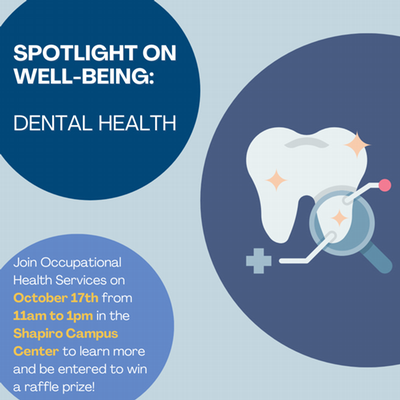Spotlight on Well-Being: Dental Care
 Dental Care is more than just having a nice smile. Your oral health is essential to your overall well-being, and can be the “silent alarm” for other health conditions. Learn more about what your mouth is telling you.
Dental Care is more than just having a nice smile. Your oral health is essential to your overall well-being, and can be the “silent alarm” for other health conditions. Learn more about what your mouth is telling you.
Dental care involves more than caring for your teeth, but your overall oral health. The mouth's microbial ecology is extremely sensitive to the challenges in the body, and as such can be the first sign of oral pathology and other medical conditions. Issues with your lips, tongue, gums, salivary glands, and oral mucosa can not only lead to heart disease, but can also be a sign of systemic disorders such as cancers, diabetes, anemia, and autoimmune syndromes. Take your oral health seriously - be sure to receive dental care at least every six months and let your health care provider know if you experience any concerning symptoms as they may be signs of the following:
Expand All
Researchers report that periodontal (gum) disease caused by poor oral hygiene can not only result in pain and tooth loss, but it also can lead to heart disease and stroke. People with gum disease have nearly double the risk for heart disease as those with healthy gums, according to the American Academy of Periodontology. Gum infection also is more prevalent in people who suffer a certain type of stroke.
Increased blood sugar helps bacteria thrive, as such people who struggle with high blood sugar levels often have problems with their teeth and gums. Oral symptoms associated with diabetes include: sore or loose teeth, fungal mouth infections, mouth ulcers, dry mouth, and cavities.
Gastroesophageal reflux disease (GERD), also known as acid reflux, occurs when the muscle at the end of your esophagus—the tube that carries food from your mouth to your stomach—randomly opens for a period of time or does not shut properly. When this occurs, contents in your stomach can leak into your esophagus, resulting in a burning sensation in your chest or throat known as heartburn. If left untreated, GERD can cause ulcers, esophageal cancer, and dental problems such as dental erosion, or dissolving of tooth surfaces.
Sjögren’s Syndrome is a health condition where a person’s immune system attacks certain parts of the body - most often this involves the tear and saliva glands. This syndrome causes dry eyes and mouth, and also dryness of the throat, skin, inside of the nose, and the vagina. It can also include symptoms of rheumatoid arthritis, such as pain and inflammation in joints, and can harm organs in the body such as the kidneys, liver, lungs, pancreas, and brain.
Anemia is a condition in which your red blood cell count is lower than normal. Anemia also occurs when your red blood cells don’t contain enough of the iron-rich protein hemoglobin, which gives blood its red hue. Your mouth may present with abnormally pale gums, an increased risk for gum disease, and inflammation of the tongue, called glossitis. The tongue may appear swollen, smooth, and pale, and it may feel sore and tender.
Oral cancer includes cancers of the mouth and the back of the throat. Oral cancers develop on the tongue, on the tissue lining the mouth and gums, under the tongue, at the base of the tongue, and the area of the throat at the back of the mouth. Because oral cancer can spread quickly, early detection is important. An oral cancer examination, which is quick, painless, and can be performed during your routine dental exam. Symptoms of oral cancer include: Persistent (lasting longer than two or more weeks) soreness, irritation, lumps or thick patches in your mouth, lip, or throat, difficulty chewing, swallowing, or speaking, pain, numbness or bleeding in the mouth, and in some cases ear pain.
On-Going Prevention and Dental Care
Dental cleanings are essential for maintaining optimal oral health and function. When combined with diligent brushing and flossing at home, dental cleanings help achieve and maintain healthy teeth and gums. At minimum, most people should be receiving dental exams and cleanings every six months. However, the time between check-ups can vary from three months to two years, depending on how healthy your teeth and gums are and your risk of future problems.
Additional Resources
 Dental Care is more than just having a nice smile. Your oral health is essential to your overall well-being, and can be the “silent alarm” for other health conditions. Learn more about what your mouth is telling you.
Dental Care is more than just having a nice smile. Your oral health is essential to your overall well-being, and can be the “silent alarm” for other health conditions. Learn more about what your mouth is telling you.